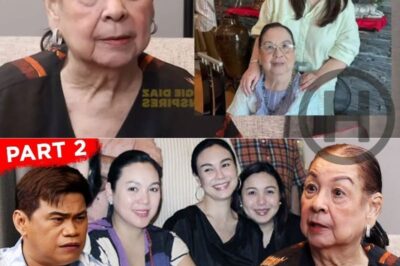The Unbreakable Voice: How Liza Soberano’s Honest Testimony Sparked a National Call to Action for Child Protection and Reform
Introduction
In a society where silence often becomes a survival strategy, speaking the truth can be an act of profound bravery. This was the case for Liza Soberano, a beloved actress and public figure in the Philippines, who recently opened up about a deeply painful and private part of her childhood. Her bold testimony has not only inspired many survivors but has also drawn the attention and praise of national institutions, prompting renewed calls for child protection reforms.
This article explores how Soberano’s personal revelations became a powerful catalyst for public awareness, institutional response, and national advocacy. It also examines the broader implications for policy, social culture, and future generations.
1. A Childhood Behind Closed Doors
Despite her image as a glamorous and graceful celebrity, Soberano revealed that her early years were anything but charmed. In a recent episode of a high-profile podcast series, she shared deeply personal memories of her childhood spent in the United States—years marked by abandonment, neglect, and mistreatment. She spoke of growing up with parents who were caught in difficult circumstances, and later being placed in environments where she experienced emotional and physical abuse.
She described moments of being belittled, being treated like a servant, and even forced into disturbing roles by those who should have protected her. Her account was raw, unfiltered, and courageous—a stark reminder of the hidden trauma that too many children endure in silence.
But this was not just a story of hardship. It was a story of survival. And more than that, it was a message—one that reverberated far beyond the entertainment industry.
2. A National Applause for Courage
Following the release of her story, the Department of Social Welfare and Development (DSWD) and the Council for the Welfare of Children (CWC) released statements commending Soberano’s bravery. These government bodies emphasized how her testimony gave strength to other survivors and helped raise critical awareness around child abuse and exploitation.
More importantly, these institutions reiterated their commitment to protecting children and strengthening systems that identify, prevent, and respond to abuse. Soberano’s honesty reignited a national conversation and reminded the public that abuse doesn’t just happen to “other people” or in faraway places—it can happen to anyone, including those we idolize on screen.
3. A Public Statement of Empowerment
Soon after the episode aired, Soberano addressed her supporters and the public through her social media platforms. In an emotionally honest message, she thanked her younger self for surviving, her audience for listening, and her supporters for believing in her truth. But most of all, she hoped that her story would serve a greater purpose: to give even just one child the courage to speak up.
In her statement, she cited troubling statistics regarding child labor, trafficking, and abuse in the Philippines. The numbers were staggering and sobering—but Soberano’s message was clear. These were not just figures; they represented real children with real lives, just like hers once was.
Her use of data and advocacy-oriented messaging showed a deeper understanding of the broader system. She wasn’t only telling her story—she was turning it into a platform for collective change.
4. The Reality Behind the Headlines
While Soberano’s story grabbed headlines, it was also a mirror held up to the nation’s child protection system. According to official statistics, thousands of Filipino children continue to face various forms of abuse—whether in the home, in institutions, or online. Despite laws and protective measures, many victims still fall through the cracks due to lack of awareness, access, or resources.
The tragedy is not that these stories exist, but that they are often normalized or ignored. Soberano’s account helped disrupt that cycle. By shining a spotlight on what often remains hidden, she forced both public opinion and official bodies to confront uncomfortable truths.
5. From Advocacy to Action
Long before her most recent revelations, Soberano had already shown signs of being more than just a celebrity. She has consistently used her platform to raise awareness on children’s rights, mental health, and gender equality. In the past, she has supported organizations focused on child welfare, spoken at conferences, and even advocated for policy reforms, such as raising the age of consent and improving access to mental health services.
Her advocacy is not performative—it is persistent. And that persistence has now reached a new level with her personal testimony. It is not just her fame that makes her voice powerful; it is her willingness to use it to uplift others.
6. A Wake-Up Call for the System
Soberano’s story has prompted government officials and advocacy groups to reflect on how to improve the nation’s child protection framework. There are now renewed calls to:
Increase public education on child abuse and trauma.
Expand access to confidential reporting mechanisms for children and youth.
Provide more trauma-informed training to social workers, teachers, and law enforcement.
Strengthen foster care systems to ensure safety and dignity for every child.
Invest in psychological and social services to help survivors heal.
While these initiatives are not new, the attention generated by Soberano’s disclosure has given them new momentum—and public support.
7. The Cultural Barrier: Why Silence Persists
In many cultures, including the Philippines, topics like abuse are often met with discomfort or denial. Family reputation, social norms, and a culture of silence frequently prevent victims from speaking up. This is especially true for public figures, who are often expected to maintain a flawless image.
Soberano’s choice to speak out—despite the potential backlash—is a bold rejection of these norms. It challenges a society to prioritize truth over appearances, and healing over silence.
Her courage may well help dismantle a culture that has, for too long, protected perpetrators by shaming victims into silence.
8. Survivors Are Not Alone
Perhaps the most powerful message in Soberano’s story is this: You are not alone.
By sharing her past, she validated the pain of countless others who have suffered in silence. She showed them that healing is possible. That their trauma does not define their worth. And that their voice matters.
She also demonstrated that breaking the silence is not a sign of weakness—it is a sign of strength. It is a form of activism, of healing, and of leadership.
9. The Role of the Media
The media played a critical role in amplifying Soberano’s story—but it also bears responsibility in how such narratives are framed. Sensationalism, victim-blaming, or minimizing abuse can retraumatize victims and distort public understanding.
Thankfully, in this case, many news outlets handled the story with respect and empathy, framing it as a call for change rather than mere scandal. This sets a standard for future coverage of sensitive topics and demonstrates the media’s potential to act as a partner in advocacy, not just a spectator.
10. What Comes Next
As the conversation around Soberano’s story continues to evolve, the question remains: What now?
Real change will require more than applause. It will require systemic reform, community involvement, and cultural transformation. It will require listening to survivors, believing them, and building structures that protect and empower them.
It also requires us—each of us—to be more aware, more compassionate, and more active in safeguarding the rights of children around us.
Soberano has done her part. Now, it’s up to the rest of us.
Conclusion: A Voice That Echoes
Liza Soberano’s voice has always been heard on television, in movies, and on social media. But now, it carries a deeper, more lasting resonance. It is the voice of a survivor. A truth-teller. A changemaker.
Her testimony is a gift—not just of truth, but of hope. It proves that even the most painful stories can become instruments of change. And that when we share our truths, we don’t just set ourselves free—we help free others, too.
The path ahead will not be easy. But with voices like hers lighting the way, it will be possible.
Further Reading
For readers interested in learning more about this issue and Soberano’s advocacy, here are some related articles:
DSWD and CWC Commend Liza Soberano’s Courage and Call for Stronger Fight Against Child Abuse
Liza Soberano Speaks Out About Childhood Trauma, Advocates for Children’s Rights
Beyond the Story: A National Reflection on Child Abuse in the Philippines
Council for the Welfare of Children Reacts to Liza Soberano’s Revelations
Liza Soberano’s Longstanding Advocacy for Child Protection and Mental Health Reform

News
Manny and Jinkee Pacquiao SUPER EXCITED for Their Grandchild with Jimuel! Manny Already Practicing! ❤️ (NH)
Manny and Jinkee Pacquiao SUPER EXCITED for Their Grandchild with Jimuel! Manny Already Practicing! ❤️ Published on October 26, 2025…
Mommy Inday Barretto: A Different Kind of Mother to Gretchen, Marjorie, and Claudine! Part 2 | Ogie Diaz (NH)
Mommy Inday Barretto: A Different Kind of Mother to Gretchen, Marjorie, and Claudine! Part 2 | Ogie Diaz Published on…
Breaking: Yu Menglong Seen in Newly Found Video, Calling Out 5 Names! (NH)
Breaking: Yu Menglong Seen in Newly Found Video, Calling Out 5 Names! Published on October 26, 2025 Introduction A shocking…
FINAL MOMENTS! This Was the Reason Behind Emman Atienza’s Pumanaw (NH)
FINAL MOMENTS! This Was the Reason Behind Emman Atienza’s Pumanaw Published on October 26, 2025 Introduction The sudden pumanaw of…
Emman Atienza’s Remains Finally Arrive in the Philippines — A Heartbreaking Final Farewell (NH)
Emman Atienza’s Remains Finally Arrive in the Philippines — A Heartbreaking Final Farewell Published on October 26, 2025 Introduction The…
It’s Shocking! The Newly Found Video Handed Over by Yu Menglong’s Manager Reveals 5 More People! (NH)
It’s Shocking! The Newly Found Video Handed Over by Yu Menglong’s Manager Reveals 5 More People! Published on October…
End of content
No more pages to load












